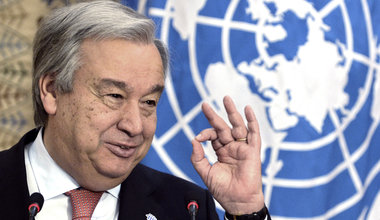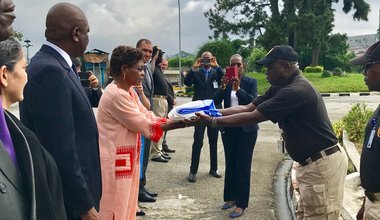Summary of UNOCI weekly press conference Abidjan, 23 June 2011
The human rights situation in Côte d'Ivoire and the launch of a vaccination campaign against polio were the main themes of the weekly press conference of the United Nations Operation in Côte d'Ivoire (UNOCI) held at the mission's headquarters on Thursday, 23 June 2011, in Abidjan.
Giving an update on the human rights situation between 10 and 17 June 2011, the acting director of the Human Rights Division, Guillaume Ngefa, highlighted "a number of human rights violations committed by elements of the Forces Républicaines de Côte d'Ivoire (FRCI)".
"In the course of the current week, FRCI elements were implicated in at least seven incidents including cases of summary executions," said Mr. Ngefa. "During these incidents FRCI elements killed at least eight people and injured several others. At least 30 people were arbitrarily arrested and detained," he noted, adding that some victims were tortured or ill-treated.
"UNOCI calls on the Ivorian authorities to carry out inquiries into these acts committed by the FRCI, as well as the exactions which some uncontrolled elements continue to commit," he said. He recommended that the maintenance of law and order should be done by professionals like the police and the gendarmerie.
Mr. Ngefa also announced that the post of an independent expert on human rights for Côte d'Ivoire is to be created by the United Nations. The independent expert, who will be nominated by the Human Rights Council, will assist the Ivorian government and other actors in the implementation of the recommendations of the International Independent Commission of Inquiry on Côte d'Ivoire and the Human Rights Council, he said.
The acting director also said that a delegation from the International Criminal Court (ICC), led by its deputy prosecutor Mrs Fatou Bensouda, will be visiting Côte d'Ivoire from 27 June to 4 July. He said UNOCI would provide logistical assistance to the ICC delegation, adding that "in this regard, UNOCI will facilitate trips to the interior of country by members of the delegation".
Mr. Ngefa also welcomed the release on 18 June of 17 people who were under house arrest in Pergola Hotel, Abidjan. He said his division had carried out a number of visits and private interviews with the dignitaries of the former regime and they had never mentioned that they had been treated badly or tortured.
He explained that UNOCI did not have a mandate to provide security at Pergola Hotel. "UNOCI's presence in this hotel is part of its mandate to protect civilians, as well as Ivorian dignitaries such as the ones who are under house arrest there in order to ensure that they are not subjected to any physical assault and that their lives are not endangered," he explained.
For his part, the representative of the World Health Organisation (WHO) in Côte d'Ivoire, Dr. Mamadou Ball, announced the launch of the second leg of National Polio Vaccination Days on 24 and 27 June 2011.
"Since the beginning of 2011, the country has been facing a new polio epidemic with 11 cases in eight health districts," he said. He said that the campaign, which is being organized by the Ivorian Ministry of Health and the Fight Against HIV/AIDS will be synchronized with neighbouring countries like Burkina Faso, Guinea, Liberia and Mali, to ensure that children who may be travelling still benefit from the vaccination campaign.
Earlier, UNOCI's deputy spokesman Kenneth Blackman had presented the Mission's sensitisation activities to strengthen social cohesion and national reconciliation in several cities in Côte d'Ivoire.
 ONU
ONU Nations Unies Maintien de la paix
Nations Unies Maintien de la paix



